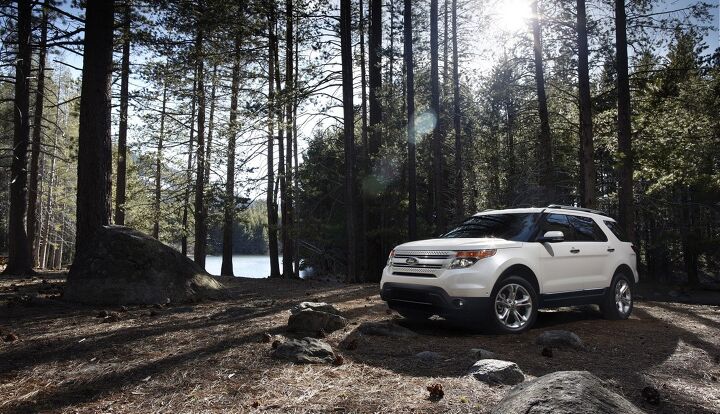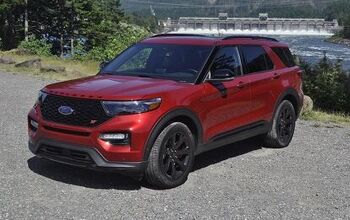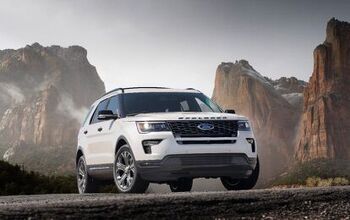Ford Exploring Counterintuitive Engine Pricing
Last week, the big news coming out of Ford was that the new Lincoln MKZ would be available with a hybrid drivetrain as a no-cost option. With Mercury on its way out, and Lincoln struggling to carve out a niche in the luxury space, that move made a certain amount of sense at the time. What we didn’t know until today is that the “free” hybrid option on the MKZ was only Ford’s opening salvo on the status quo of automotive drivetrain option pricing. Today, with the 2011 Explorer dominating the news cycle, Ford has announced its latest head-scratcher: making the four-cylinder “Ecoboost” engine option more expensive than the more powerful standard V6. Yes, really.
The 2011 Explorer’s base engine is a 290 HP, 255 lb-ft, 3.5 liter Duratec V6, essentially an un-turbocharged version of the Ecoboost V6 found in the Taurus SHO. Ford hasn’t released EPA numbers for either version of the Explorer, but says that the base model should get better fuel economy than the Honda Pilot, which gets 17/23 in 2WD trim, and 16/22 in 4wd trim. Ford hasn’t released pricing for the new Explorer, but it’s telling Automotive News [sub] that the optional engine, a 2.0 liter Ecoboost-branded turbocharged four-cylinder will be more expensive.
And what do you get for more money? To put it simply: less. Less power, for one thing. The Ecoboost engine offers 237 hp (down 53 hp to the V6), and 250 lb-ft, a mere 5 lb-ft reduction. The Ecoboost also offers less need to rev, with peak torque arriving as low as 1,700 RPM. But the most important area in which the Ecoboost engine delivers less, is in fuel consumption. According to Ford, the Ecoboost two-liter Explorer will return similar fuel economy to a V6 Toyota Camry, which means fuel economy should improve to around 19/26 [Ford PDF on both engines here]. Those numbers are, in a nutshell, why Ford has decided to take the barely-precedented step of charging more for an optional four-cylinder than the standard V6.
But how much more will Ford charge for the extra several miles per gallon? There’s no official word yet, but Ford charges a $3,000 to $6,000 premium for Ecoboost-equipped versions of its Flex CUV [UPDATE: Ford has released pricing for non-Ecoboost Explorer here]. On the other hand, those vehicles offer more horsepower from their turbocharged V6 than their corresponding base models, so that premium makes some sense. Also, in yet another break from past engine-option practice, Ford will not require AWD on Ecoboost-equipped Explorers. These factors should conspire to keep the Ecoboost premium lower for the Explorer than the Flex, although there could be a non-financial cost to choosing the Ecoboost four on a new Explorer: towing. Ford says the standard Explorer will tow 5,500 lbs “when properly equipped.” The Ecoboost version has not yet been tow-rated, and though it’s down only 5 lb-ft of torque, it could well receive a lower rating than the standard Explorer.
All of which leads to a pretty crucial question: who buys a vehicle like the Explorer if they’re willing to pay more and potentially give up capability for improved fuel economy? Ford refuses to take the question head-on, preferring to make the Ecoboost option about rehabilitating the Explorer nameplate after its front-and-center role in the excesses of the SUV era. Ford’s Chief Engineer Jim Holland tells AN [sub]:
We really want to make a statement that the old baggage on fuel economy with the Explorer is gone. To get great fuel economy it takes technology, and it’s our view that people will pay for that… The impact of rising gas prices has really stuck with people. People now buy more expensive light bulbs to be more efficient. We’re moving to a point where people make the choice to be more responsible
Lightbulbs are one thing, cars are another. Sure, we can see that America is downsizing, but consumers still have yet to be asked to pay more for a non-hybrid but more fuel-efficient drivetrain, when more power is available in the same vehicle for cheaper. If Ford can get consumers to understand and accept the notion that downsized and turbocharged engines are worth a modest premium, they’ll steal yet another march on their competitors. If not, and Americans ignore the Ecoboost Explorer in favor of its cheaper, more-powerful cousin, Ford may well retreat from the Ecoboost premium altogether, and offer the V6 and Turbo-Four at the same price.
More by Edward Niedermeyer
Latest Car Reviews
Read moreLatest Product Reviews
Read moreRecent Comments
- Lou_BC Blows me away that the cars pictured are just 2 door vehicles. How much space do you need to fully open them?
- Daniel J Isn't this sort of a bait and switch? I mean, many of these auto plants went to the south due to the lack of unions. I'd also be curious as how, at least in my own state, unions would work since the state is a right to work state, meaning employees can still work without being apart of the union.
- EBFlex No they shouldn’t. It would be signing their death warrant. The UAW is steadfast in moving as much production out of this country as possible
- Groza George The South is one of the few places in the U.S. where we still build cars. Unionizing Southern factories will speed up the move to Mexico.
- FreedMike I'd say that question is up to the southern auto workers. If I were in their shoes, I probably wouldn't if the wages/benefits were at at some kind of parity with unionized shops. But let's be clear here: the only thing keeping those wages/benefits at par IS the threat of unionization.


































Comments
Join the conversation
I think they're serious...and crazy! The new Fiesta better be a BIG mover for Ford...because I don't think well-equipped Explorers with a 2.0L Turbo at $35K are going to be 'volume sellers'...